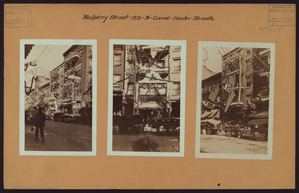This discrepancy in the quality of Josephine Baldizzi’s memory echoes what contemporary critics and later scholars said about the Catholicism of southern Italian immigrants and their children. Immigrants from southern Italy to the United States in the years of the “great migration,” from the 1880s to the 1920s—Josephine’s father slipped in after the gates had been closed in 1924 by federal legislation—had the reputation of being especially bad Catholics. They were “the Italian problem” in the American Catholic church, in the phrase of the times.
Southern Italians were bad Catholics, moreover, in a particular way: they went to church, it was said, only for baptisms, weddings, and funerals—in other words, only on occasions important to their families. Otherwise, the immigrants failed to support the building and maintenance of churches like other Catholics did; they left the practice of the faith to women and old people; and they refused to send their children to parochial schools as good Catholics were supposed to do. The saw nothing wrong with free public education, up the sixth grade, when enough was enough, and they took their children out of school and sent them to work to support the family. As Josephine remembers, “My mother used to say, what are you doing in high school? Go to work and you make a few dollars.”
 |
| Milstien Division, NewYork Public Library. San Genaro on Mulberry Street, 1929 and 1930. |
All Italians cared about religiously, American Catholics complained, were their feste. These riotous public celebrations in honor of regional southern Italian saints were occasions for paisani to get together in the streets and in their homes to eat and drink, to talk and to play games of chance, much to the embarrassment of other, better established, more “American,” Catholics, who were mostly Irish. Priests and prelates protested that saints’ feasts wasted financial resources better spent on the church.
The bargaining and dealing that went on between the people and the saints on these days—if you heal my child, give me a husband, or find me a job, I will give you in return . . .—was evidence of a magical and immature religious consciousness out of step with the modern world. Sociologists accused southern Italians of being “amoral familists,” meaning that their sense of ethical responsibility extended no further than their own families. It was not until the 1970s that the Catholicism of the children and grandchildren of Italian immigrants was thought to have caught up with that of other ethnic groups.
[Part IV will be posted later this afternoon.]

No comments:
Post a Comment
Note: Only a member of this blog may post a comment.